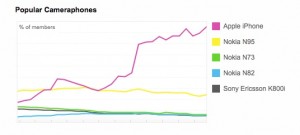Steven Levy (of Newsweek and author of that wonderful book on the history of the Apple Macintosh) has started something. In an article in Wired he wrote that he felt “guilty that I have a blog and haven’t contributed to it for seven months. Guilty that all my pals on Facebook post cool pictures, while the last shots I uploaded were of Fourth of July fireworks—from 2007. Guilty that I haven’t Dugg anything since, well, ever.”
Eh? But then he explains that the guilt comes from the feeling that he might be regarded as a free-rider. “Because of time constraints and just plain reticence, I worry that I’m snatching morsels from the information food bank without making any donations. Instead of healthy, reciprocal participation, I’m flirting with parasitic voyeurism.”
So he tries to overcome guilt by sharing. This then triggers another emotion: remorse.
It’s fun to track the digital ejaculations of selected Twitterati. But a couple thousand people signed up unsolicited to follow my tweets. And I feel guilty when not serving this hungry crowd — remorseful when I am.
Since I don’t know many in this mob, I try not to be personally revealing. Still, no matter how innocuous your individual tweets, the aggregate ends up being the foundation of a scary-deep self-portrait. It’s like a psychographic version of strip poker—I’m disrobing, 140 characters at a time.
Gosh, isn’t life complicated? Enter, stage right, Nicholas Carr, the Net’s own Stern Moralist. “Though he never names it”, Carr writes, “what Levy is really talking about here is shame”.
And the shame comes from something deeper than just self-exposure, though that’s certainly part of it. There’s an arrogance to sharing the details of one’s life in public with strangers – it’s the arrogance of power, the assumption that such details somehow deserve to be broadly aired. And as for the people, those strangers, on the receiving end of the disclosures, they suffer, through their desire to hear the details, to hungrily listen in, a kind of debasement. At the risk of going too far, I’d argue that there’s a certain sadomasochistic quality to the exchange (it’s a variation on the exchange that takes place between celebrity and fan). And I’m pretty sure that Levy’s remorse comes from his realization, conscious or not, that he is, in a very subtle but nonetheless real way, displaying an undeserved and unappetizing arrogance while also contributing to the debasement of others.
Carr’s right about the celebrity-fan relationship: it’s deeply creepy. I saw something of it in the years when I was a TV critic and became friendly with a number of people who — because of their TV roles — had become national celebrities. Being out with them in public was a revealing experience, because of the way that total strangers seemed to think that, in some way, they owned them.
In the old days of a TV-dominated media culture, broadcast media had the power to create celebrity — to transform performers into public property. What’s changed with the Net is that it has given people the capacity to turn themselves into celebrities. Think of Robert Scoble, for example — a self-made celeb if ever there was one. One index of this new kind of celebrity is one’s Twitter Index — the ratio between the number of people you follow to those who follow you. My view is that, for most people, this should be close to 1. (Disclosure: I’ve just checked and my Index is currently 84/110, which is too low. I’m pretty picky about accepting ‘follow’ requests, but I’ve obviously been too lax recently.)
If you’re still reading, you’ll have spotted the qualifier “for most people” in that last paragraph. Although the celebrity-fan relationship is pathological and unhealthy, there are some absurd Twitter Indices that I regard as reasonable. As I write, for example, Dave Winer has 17,081 followers. Howard Rheingold has 6,871. Tim O’Reilly has 27,446. Yet this doesn’t bother me in the way that old-media celebrity did. Why?
The answer, I guess, has something to do with the fact that these people are not “famous for being famous” (the definition of mass-media celebrity) but famous for being interesting. And that’s very different.


